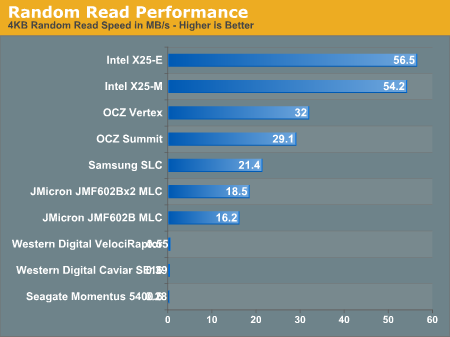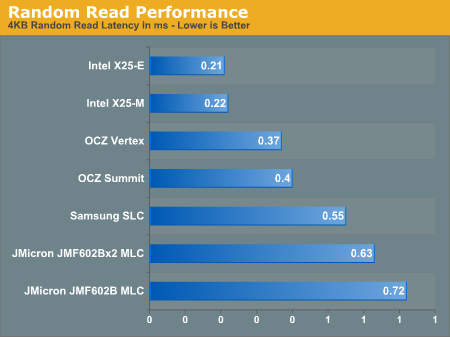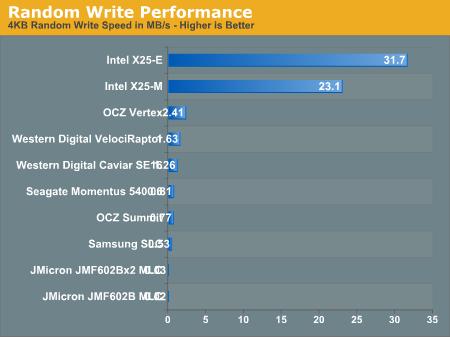The SSD Anthology: Understanding SSDs and New Drives from OCZ
by Anand Lal Shimpi on March 18, 2009 12:00 AM EST- Posted in
- Storage
Random Read/Write Performance
Arguably much more important to any PC user than sequential read/write performance is random access performance. It's not often that you're writing large files sequentially to your disk, but you do encounter tons of small file reads/writes as you use your PC.
To measure random read/write performance I created an iometer script that peppered the drive with random requests, with an IO queue depth of 3 (to add some multitasking spice to the test). The write test was performed over an 8GB range on the drive, while the read test was performed across the whole drive. I ran the test for 3 minutes.

The three hard drives all posted scores below 1MB/s and thus aren't visible on our graph above. This is where SSDs shine and no hard drive, regardless of how many you RAID together, can come close.
The two Intel drives top the charts and maintain a huge lead. The OCZ Vertex actually beats out the more expensive (and unreleased) Summit drive with a respectable 32MB/s transfer rate here. Note that the Vertex is also faster than last year's Samsung SLC drive that everyone was selling for $1000. Even the JMicron drives do just fine here.
If we look at latency instead of transfer rate it helps put things in perspective:

Read latencies for hard drives have always been measured in several ms, but every single SSD here manages to complete random reads in less than 1ms under load.
Random write speed is where we can thin the SSD flock:

Only the Intel drives and to an extent, the OCZ Vertex, post numbers visible on this scale. Let's go to a table to see everything in greater detail:
| 4KB Random Write Speed | |
| Intel X25-E | 31.7 MB/s |
| Intel X25-M | 23.1 MB/s |
| JMicron JMF602B MLC | 0.02 MB/s |
| JMicron JMF602Bx2 MLC | 0.03 MB/s |
| OCZ Summit | 0.77 MB/s |
| OCZ Vertex | 2.41 MB/s |
| Samsung SLC | 0.53 MB/s |
| Seagate Momentus 5400.6 | 0.81 MB/s |
| Western Digital Caviar SE16 | 1.26 MB/s |
| Western Digital VelociRaptor | 1.63 MB/s |
Every single drive other than the Intel X25-E, X25-M and OCZ's Vertex is slower than the 2.5" Seagate Momentus 5400.6 hard drive in this test. The Vertex, thanks to OCZ's tweaks, is now 48% faster than the VelociRaptor.
The Intel drives are of course architected for the type of performance needed on a desktop/notebook and thus they deliver very high random write performance.
Random write performance is merely one corner of the performance world. A drive needs good sequential read, sequential write, random read and random write performance. The fatal mistake is that most vendors ignore random write performance and simply try to post the best sequential read/write speeds; doing so simply produces a drive that's undesirable.
While the Vertex is slower than Intel's X25-M, it's also about half the price per GB. And note that the Vertex is still 48% faster than the VelociRaptor here, and multiple times faster in the other tests.










250 Comments
View All Comments
Luddite - Friday, March 20, 2009 - link
So even with the TRIM command, when working with large files, say, in photoshop and saving multiple layers, the performance will stil drop off?proviewIT - Thursday, March 19, 2009 - link
I bought a Vertex 120GB and it is NOT working on my Nvidia chipsets motherboard. Anyone met the same problem? I tried intel chipsets motherboard and seems ok.I used HDtach to test the read/write performance 4 days ago, wow, it was amazing. 160MB/s in write. But today I felt it slower and used HDtach to test again, it downs to single digit MB per second. Can I recover it or I need to return it?
kmmatney - Thursday, March 19, 2009 - link
Based on the results and price, I would say that the OCZ Vertex deserves a Editor's choice of some sort (Gold, Silver)...Tattered87 - Thursday, March 19, 2009 - link
While I must admit I skipped over some of the more technical bits where SSD was explained in detail, I read the summaries and I've gotta admit this article was extremely helpful. I've been wanting to get one of these for a long time now but they've seemed too infantile in technological terms to put such a hefty investment in, until now.After reading about OCZ's response to you and how they've stepped it up and are willing to cut unimportant statistics in favor of lower latencies, I actually decided to purchase one myself. Figured I might as well show my appreciation to OCZ by grabbing up a 60GB SSD, not to mention it looks like it's by far the best purchase I can make SSD-wise for $200.
Thanks for the awesome article, was a fun read, that's for sure.
bsoft16384 - Thursday, March 19, 2009 - link
Anand, I don't want to sound too negative in my comments. While I wouldn't call them unusable, there's no doubt that the random write performance of the JMicron SSDs sucks. I'm glad that you're actually running random I/O tests when so many other websites just run HDTune and call it a day.That X25-M for $340 is looking mighty tempting, though.
MrSpadge - Thursday, March 19, 2009 - link
Hi,first: great article, thanks to Anand and OCZ!
Something crossed my mind when I saw the firmware-based trade-off between random writes and sequential transfer rates: couldn't that be adjusted dynamically to get the best of both worlds? Default to the current behaviour but switch into something resembling te old one when extensive sequential transfers are detected?
Of course this neccesiates that the processor would be able to handle additional load and that the firmware changes don't involve permanent changes in the organization of the data.
Maybe the OCZ-Team already thought about this and maybe nobody's going to read this post, buried deep within the comments..
MrS
Per Hansson - Thursday, March 19, 2009 - link
Great work on the review AnandI really enjoyed reading it and learning from it
Will there be any tests of the old timers like Mtron etc?
tomoyo - Thursday, March 19, 2009 - link
That was kind of strange to me too. But I assume Anand really means the desktop market, not the server storage/business market. Since it's highly doubtful that the general consumer will spend many times as much money for 15k SAS drives.Gary Key - Thursday, March 19, 2009 - link
The intent was based it being the fastest for a consumer based desktop drive, the text has been updated to reflect that fact.tomoyo - Thursday, March 19, 2009 - link
I've always been someone who wants real clarify and truth to the information on the internet. That's a problem because probably 90% of things are not. But Anand is one man I feel a lot of trust for because of great and complete articles such as this. This is truly the first time that I feel like I really understand what goes into ssd performance and why it can be good or bad. Thank you so much for being the most inciteful voice in the hardware community. And keep fighting those damn manufacturers who are scared of the facts getting in the way of their 200MB/s marketing bs.